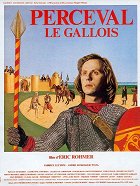Realização:
Eric RohmerArgumento:
Eric RohmerCâmara:
Néstor AlmendrosMúsica:
Guy RobertElenco:
Fabrice Luchini, André Dussollier, Marie Rivière, Pascale de Boysson, Guy Delorme, Arielle Dombasle, Marie-Christine Barrault, Michel Etcheverry (mais)Streaming (1)
Conteúdos(1)
Esta é a história da longa jornada de Perceval, um jovem corajoso que sonha ser cavaleiro do Rei Artur. Inspirado na obra de Chrétien de Troyes e tendo como cenário a época medieval, o filme de Rohmer aborda a iniciação às armas, o amor cortês, a amizade e a união entre cavaleiros, bem como o árduo percurso de acesso à espiritualidade e à palavra divina. (Leopardo Filmes)
(mais)Críticas (2)
A complete cinematic oddity, the form of which some people probably can't stand, as I experienced first-hand at the SFS screening. Rohmer conceived the whole film as an early medieval painting, abandoning any sense of proportion. The trees are flat, made of a single piece of plywood and as tall as the people, the actors stand in front of a castle that is only slightly taller, and during the dialogues we see the actors' faces in profile, while their bodies are facing the viewer. It may bring a smile to the unprepared viewer, it is unusual, but it is remarkable. When I add the period songs, the final impression is almost perfect. This is not something you’ll ever see on commercial TV :)
()
Rohmer embarked on the revival of the medieval book with everything it encompasses - besides the text, he also reincarnated to a large extent everything else that belongs to the medieval codex, namely illuminations. This is truly one of the most faithful film adaptations of literary source material...(to which is added typical period storytelling, as was prevalent during the banquets of that time, where these stories were reproduced.) The immense merit of this film lies in its faithfulness to the source material; however, perhaps paradoxically, my main criticism of the film also emerges therefrom: the intellectual depth of the plot is simply at the level of 12th-century epics, and it is simply a "just" a story about a knight, at times as flat as pre-Renaissance paintings without perspective. In this, the film differs from another film based on the motifs of Chrétien de Troyes, which was made just four years earlier and directed by another French giant, namely Bresson's Lancelot of the Lake (1974).
()

